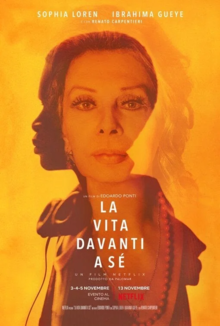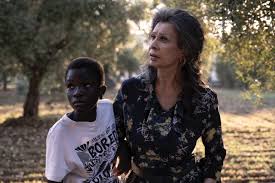|
“The Life Ahead” stars Sophia Loren, Ibrahima Gueye, Abril Zamora, Renato Carpentieri, Babak Karimi, and Massimiliano Rossi. Released on Netflix on November 13, 2020, the film is about a woman who takes in and befriends a young street kid. The film is directed by Edoardo Ponti, who also directed films such as “Between Strangers” and “Coming & Going”. It is based on the 1975 novel The Life Before Us by Romain Gary. This year’s awards season is not 100% complete without an international film or two. While a lot of awards ceremonies celebrate the art of filmmaking in the United States, they never shy away from the films that were made by people from different countries, ranging from France to Japan. Throughout the years, these types of films have proven to us that everyone has a story to tell and a talent to represent in their own native country, not just people in the U.S.A., and the one that I’ll be reviewing today is no exception. I haven’t seen the trailer for this one, so I’m pretty much going into this blind. If you’re wondering why I chose this film, it’s because the world is still keeping me inside the house away from the cinema, and I needed to find something to write about. The source material has already seen the 1977 film adaptation by Israeli director Moshé Mizrahi, a 2010 television film by Myriam Boyer, and a short-lived musical by Harold Prince. Now it’s Edoardo Ponti’s turn to bring this story to life via film. Was he able to pull it off? The story follows Madame Rosa (Loren), a Holocaust survivor who runs a daycare business in an apartment building for the children of prostitutes. She comes across a young orphaned kid named Momo (Gueye) who attempted to rob her while she was shopping. Rosa is then forced to allow him to live with her and the children in the building. They start to form a relationship with each other as they learn more from one another and face life’s difficult challenges. Similar to the source material, “The Life Ahead” is told from the perspective of Momo and deals with specific topics like prostitution, the effects of the Holocaust, and immigration. In the midst of those themes is a young boy’s journey of adolescence, understanding, and acceptance. While this type of journey didn’t quite reach its full potential, it’s something that’s worth taking regardless. There were a few elements in the story that either felt familiar or weren’t strongly developed enough. However, Ponti was able to make up for these flaws by providing some beautifully-shot sequences as well as some solid amounts of heart. A lot of people have been saying that it’s the type of film that’s elevated by some strong talent onscreen, and after watching it for myself, I tend to agree. The cast delivered performances that offered a perfect amount of believability and realism into their characters. They’re not overwhelming, but they’re also not underwhelming either. The main highlight of the cast was Sophia Loren, who takes on the role of Madame Rosa in this version. I haven’t seen Loren in her other roles before this one, so consider this as my first encounter with this well-known Italian actress. Her acting range perfectly reflects Rosa’s personality: a strict woman who is also vulnerable because of what happened to her during her childhood. It’s Loren’s ability to immerse herself within her character that makes her performance so captivating, which might be the reason why she’s so beloved for many years. I could definitely see her getting some awards recognition for her acting. Interesting fact: Loren is actually Edoardo Ponti’s mother. Ibrahima Gueye also did a really good job with his performance as Momo. This is another performance from a child actor that’s absolutely more tolerable than annoying when it comes to how they portray a relatable character. Momo is the type of character who learns how to care for others instead of himself, and the script by Ponti and Ugo Chiti was suitable enough to make this character arc engaging. If there’s something that I want to point out that’s neither a pro or a con, it would have to be the film’s dubbing, most notably the English dub. On Netflix, the film is released with both the original Italian dub with subtitles and the English dub, so if you’re the type of person who doesn’t like getting distracted by the subtitles, feel free to watch the latter. Personally, I think the original dub was better because the English dub was a bit distracting in terms of their words not matching the characters’ lip movements. It wasn’t until about 14 minutes in that I decided to switch to the Italian dub, a decision that made my experience a lot better. I can handle English dubs of animated features and shows from Japan for that same reason, but dubs for live-action features? No way. In other words, I would highly recommend you watch the original dub to get the full experience. Overall, “The Life Ahead” is a heartfelt and well-intentioned drama that’s powered by a strong cast and a confident director behind the camera. Its storytelling is far from perfect, but its soul is inspiring enough to compensate for its mistakes, largely due to the performances (most notably Loren), Ponti’s direction, and a respectable script. These things alone should make this film a possible awards contender, especially for the “Best International Film” category or the “Best Actress” category for Loren or even both. If you’re a fan of international films in general, it’s definitely worth checking out. B+
0 Comments
Leave a Reply. |
Home of the most friendly movie reviews on the planet.
Categories
All
Follow Me |
- Home
- Classic Reviews
- 2015 Reviews
- 2016 Reviews
- 2017 Reviews
- 2018 Reviews
- 2019 Reviews
- 2020 Reviews
- 2021 Reviews
- 2022 Reviews
- 2023 Reviews
- 2024 Reviews
- Movie Talk
-
Fan Fictions
-
Ed, Edd n Eddy: The Ultimate Ed-Chronicles
>
-
The 'Beginnings' Saga
>
- Ed, Edd n Eddy: The Rise of Maleficent >
- Transformers: Legend of the Black Cauldron >
- Ed, Edd n Eddy meets the Penguins of Madagascar >
- The Eds and Iron Man: Dawn of the Blowhole >
- Ed, Edd n Eddy: The Fast and the Furious >
- The Eds and Kung Fu Panda: Battle for China >
- Ed, Edd n Eddy and the Lion King: The Full Circle >
- Ed, Edd n Eddy meets Thumbelina: Revenge of the Shredder >
- Ed, Edd n Eddy: Journey to Neverland >
- Ed, Edd n Eddy: All Tangled Up >
- Ed, Edd n Eddy's Frozen Adventure >
- Ed, Edd n Eddy's Edventures in San Fransokyo
- Ed, Edd n Eddy: Return to Neverland
- Ed, Edd n Eddy vs The League of Evil
-
The 'Avengers' Saga
>
- The Eds and the Little Mermaid: Age of Extinction
- Ed, Edd n Eddy meets the Ghostbusters
- Ed, Edd n Eddy: A Sea of Adventure
- Ed, Edd n Eddy meets Anastasia
- Ed, Edd n Eddy in Who Framed Roger Rabbit?
- Ed, Edd n Eddy meets the Incredibles
- Ed, Edd n Eddy and the Lion King 2: Simba's Pride
- Ed, Edd n Eddy: Brand New Zootopia
- Ed, Edd n Eddy: Into the Sugar Rush
- Ed, Edd n Eddy and the Big Sea Quest
- Ed, Edd n Eddy: Heroes Assemble
- Fastformers: Rio Heist
- The Loud Ghostbusters >
-
The 'Beginnings' Saga
>
-
Ed, Edd n Eddy: The Ultimate Ed-Chronicles
>
- Contact
- About


